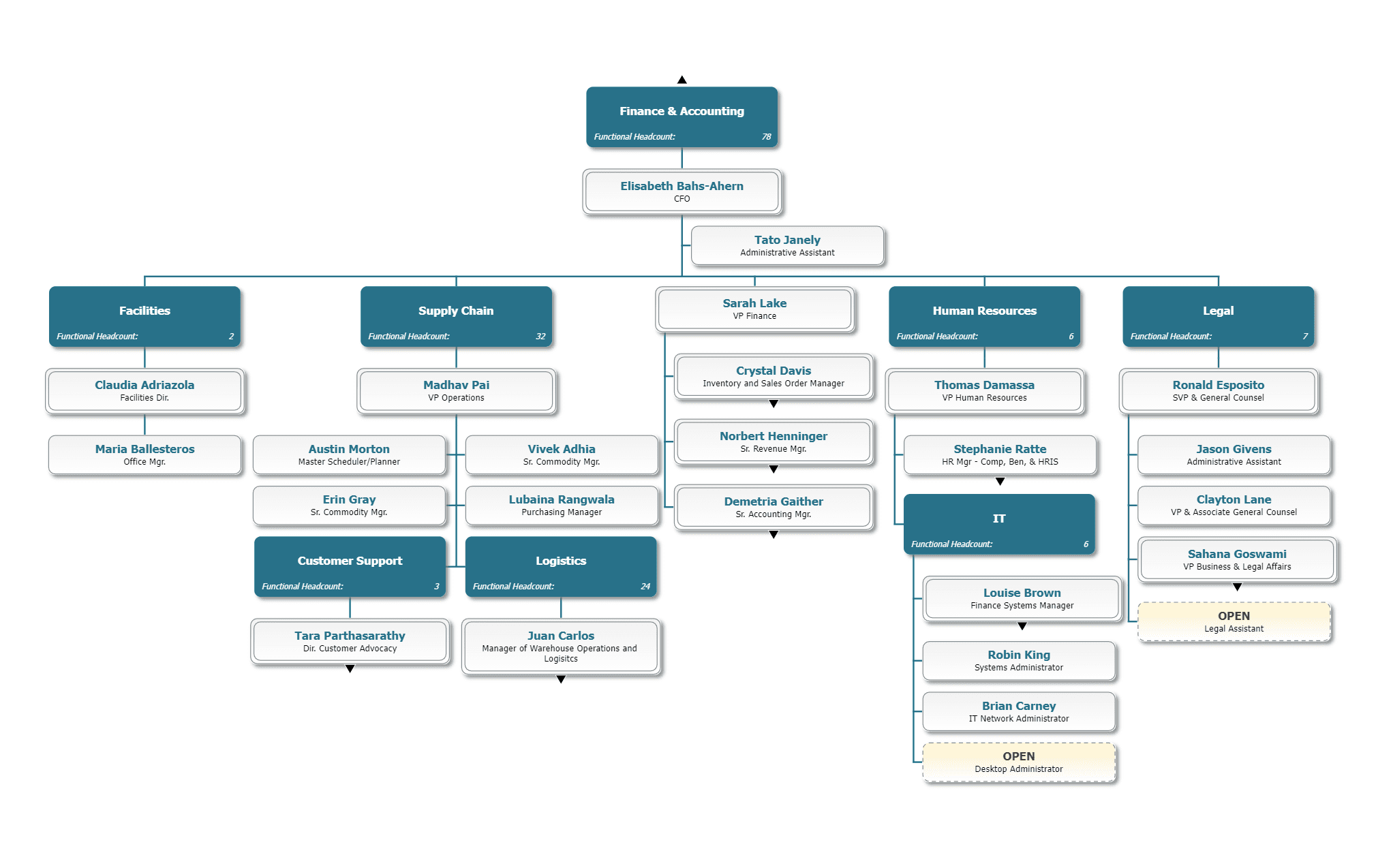
Kimberlee Henry
July 20, 2023
HR professionals overcoming challenges, catalyzing strategic planning and decision-making.…

Understanding your organization’s inner workings is crucial in today’s dynamic business environment. As an HR professional or executive, you play a pivotal role in strategy, operations, and organizational transformation.
Yet, maintaining up-to-date workforce data, generating reports, and tracking key metrics can be a complex balancing act. Think of the daunting task of creating constantly evolving org charts or the stress of decision-making based on critical metrics. Managing your organization’s present while planning its future can feel overwhelming. Creating visually appealing and accurate org charts, providing comprehensive employee data analysis, and guiding forward-looking organizational planning demands significant time, meticulous attention to detail, and strategic insight — precious resources you could put toward your essential responsibilities.
Consider consolidating disparate data sources to assemble an org chart, only to discover that it becomes outdated the moment it’s finalized. It’s never finalized! Or the challenge of monitoring critical metrics and the stress of making decisions based on this data.
This begs the question: How do you streamline these processes to control your organization’s development better and boost your strategic decision-making capacity? How do you zoom out without losing the details that drive intelligent strategies? How would your role and career evolve if you had the data and time you need?
In the workforce visibility narrative, the protagonist is not just one person but a collective representation of all who aim to influence their organization’s growth. As an HR professional or leader, you provide accurate workforce data and ongoing reports, including detailed org charts. You are the key player responsible for driving core HR systems and processes and shaping your organization’s future.
As an org design professional, you align the workforce with company objectives through strategic planning and facilitating initiatives like restructuring, M&A, and divestitures. The pressure to have accurate and up-to-date information to make these crucial decisions is constantly on your shoulders.
Administrative assistants, often responsible for supporting executives and generating organizational charts, have a direct line to decision-makers, making your role pivotal in shaping your organization’s structure and future.
And for you, executives, department heads, and project managers making critical decisions with far-reaching implications is part of your day-to-day responsibility. You need accurate workforce reports and metrics to drive these decisions.

People who make the best use of their org charts hail from organizations that value HR technology and data-driven decision-making. Your commitment to your organization’s growth and your belief in the power of effective HR systems and data insights bind you all together.
Together, you are the protagonists of the global story of organizational design.
The challenges that cloud your ability to operate strategically and efficiently come in the guise of inefficient tools and systems, impersonal solutions, internal struggles, and philosophical dilemmas that act as roadblocks in your quest for organizational efficiency and strategic decision‑making.
The drawbacks of manual diagramming tools for creating org charts:
Traditional manual diagramming tools for org charts put organizations at risk of making decisions based on outdated charts. These time-consuming tools drain productivity as they lack real-time integration with data sources, resulting in org charts that become outdated the moment they are published.
Generic org chart solutions often lack flexibility, failing to capture your organization’s unique dynamics. Their one-size-fits-all approach doesn’t truly reflect the DNA of your organization.
Rigid Human Capital Management systems (HCMs) struggle to adapt to your changing needs, limiting your ability to visualize and plan future scenarios aligning with strategic goals.
The continuous administrative tasks, such as data verification and metric tracking, consume your time, hindering strategic planning and decision-making. Manually entering, updating, and cross-checking data to keep your org chart current is time-consuming and leaves room for error.
These daunting challenges can make administrative tasks eclipse your role’s strategic potential. Yet, recognizing these challenges is the first step to overcoming them and enhancing your strategic contribution to your organization’s success.

Though OrgChart is one of the more affordable solutions on the market, when you’re considering a tool like org chart automation software, it’s essential to understand the costs of your current solution and the tangible benefits of this investment. Let’s explore OrgChart’s impact on your day-to-day operations and the impressive return on investment it can deliver.
Remember, the real value of OrgChart goes beyond numbers. It’s about empowering HR professionals to fulfill their strategic potential and contribute more significantly to their organization’s success. Request a demo today and witness firsthand how OrgChart can transform your HR function and deliver impressive ROI.
As an HR professional, you encounter the constant challenge of swiftly creating accurate and accessible organizational charts. Your requirements don’t stop at chart creation; you also need these charts to be easily shareable with team members. To help you overcome this challenge, we’ve developed a solution that simplifies your “Connect, Configure, Export, Repeat” routine when updating org charts daily, weekly, or monthly.
You assess seven crucial aspects when choosing or continuing with a solution: ease of setup, data accuracy, quality of presentation, process repeatability, user experience, the uniqueness of the solution, and its overall value. Recognizing these, we consistently work to surpass your expectations in all these areas.
We understand that our tools need to do more than streamline chart creation; they should empower you. Our solution helps you impress your peers and superiors with accurate, visually engaging charts, establishing you as a critical resource in your organization.

We see each step of your journey not as a potential shortcoming but as an opportunity for learning and enhancement. Your success is our ultimate goal. While we celebrate the milestones we’ve already achieved, we remain committed to pushing boundaries, continually seeking improvements to aid your growth.
We aspire to be your gold standard for org charts, as indispensable to you as Bosch is to car parts or Delta is to plumbing supplies. To fulfill this ambition, we continually refine our core processes of “Connect, Configure, Export, Repeat.”
We want your setup experience to be as smooth as possible. We focus on reducing your ‘Time to First Chart’ (TtFC) to achieve this. We work on making the connection to your source data as seamless as possible, providing handy templates, and streamlining chart customization and background setup.
To ensure your charts accurately represent your organization, we’ve developed tools for data cleanup and data override. These functionalities are designed to maintain the accuracy of your org charts, even when data in your HCM system may be incomplete or incorrect.
We understand the importance of first impressions. That’s why we are constantly improving the visual appeal of your org charts with features like better photo handling, improved connecting lines, and professional-quality emojis.
We’ve carefully designed OrgChart with unique features beyond standard org chart tools.
Embedding charts on intranets enables your entire organization to have access to a real-time structure of the company, fostering transparency and unity. The option to create functional charts further enhances the software’s flexibility, allowing you to visualize the design of your organization in the most meaningful way.

With OrgChart, you can map employees to multiple managers, reflecting matrix reporting structures accurately. You also can filter remote employees, an essential feature for modern companies with geographically diverse teams.
Additionally, OrgChart allows you to track open or vacant positions, giving you a clear view of the areas where new talent is needed. The software lets you override your HR system data, allowing you to customize your org charts to your unique specifications.
Request a demo today and explore the possibilities of connecting your HRIS to OrgChart. Discover firsthand how easy it is to create accurate, visually appealing org charts continuously updated with real‑time data.

With OrgChart, you’re not limited by your HRIS data. The system allows you to override data, offering greater flexibility in how your org charts are presented. You can visualize remote employees, track open positions, and do much more.
As a tool for strategic business partnering, OrgChart facilitates workforce planning initiatives by providing an in-depth visualization of your organization. Identifying trends, tracking metrics, and identifying gaps allows HR professionals to serve as strategic partners in their organizations.
Empower your HR department and add value to your organization with OrgChart. Request a demo today, and take the first step toward a more efficient, strategic, and data-driven HR function.
Read success stories on G2.

Managing Positions in a Company Chart: Strategies for Modern HR Teams…
As companies grow beyond 100 employees, managing organizational structure becomes exponentially more complex. HR professionals need an advanced, dynamic…
Read Article
Restaurant Hierarchy Chart: Structure & Roles…
Restaurants are arguably the busiest businesses out there, with servers, cooks, managers, and executives working hard to ensure every guest has a stellar…
Read Article
Healthcare Organizational Chart: Structure, Examples & How to Build One…
Explore the power of People Analytics. Unlock data-driven HR strategies to optimize your workforce with our tools.…
Read Article